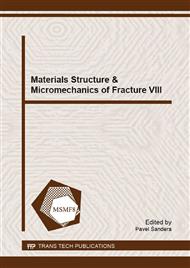p.534
p.538
p.542
p.546
p.550
p.554
p.558
p.562
p.566
Aging of the β21S Titanium Alloy
Abstract:
Ti-β21S is a β-metastable titanium alloy, currently used in industries such as aeronautics, because of its cold formability, good mechanical properties at elevated temperature, low density and its strong resistance to oxidation. This alloy is hardened by an α-phase precipitation in the β-matrix. The purpose of the present research is to establish the effect of aging on the microstructure and mechanical properties of Ti-β21S. Different thermal aging tests have been carried out at 600°C and at 650°C for 500 hours in laboratory air. The evolution of the microstructure has been reported after each thermal treatment and associated with room temperature tensile tests results.
Info:
Periodical:
Pages:
550-553
DOI:
Citation:
Online since:
December 2016
Authors:
Keywords:
Price:
Сopyright:
© 2017 Trans Tech Publications Ltd. All Rights Reserved
Share:
Citation:


